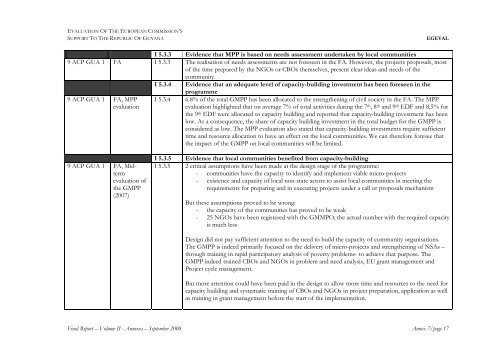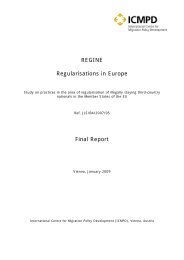Annexes - European Commission - Europa
Annexes - European Commission - Europa
Annexes - European Commission - Europa
Create successful ePaper yourself
Turn your PDF publications into a flip-book with our unique Google optimized e-Paper software.
EVALUATION OF THE EUROPEAN COMMISSION’S<br />
SUPPORT TO THE REPUBLIC OF GUYANA<br />
EGEVAL<br />
I 5.3.3 Evidence that MPP is based on needs assessment undertaken by local communities<br />
9 ACP GUA 1 FA I 5.3.3 The realisation of needs assessments are not foreseen in the FA. However, the projects proposals, most<br />
of the time prepared by the NGOs or CBOs themselves, present clear ideas and needs of the<br />
community.<br />
I 5.3.4 Evidence that an adequate level of capacity-building investment has been foreseen in the<br />
programme<br />
9 ACP GUA 1 FA, MPP<br />
evaluation<br />
I 5.3.4 6.8% of the total GMPP has been allocated to the strengthening of civil society in the FA. The MPP<br />
evaluation highlighted that on average 7% of total activities during the 7 th , 8 th and 9 th EDF and 8,5% for<br />
the 9 th EDF were allocated to capacity building and reported that capacity-building investment has been<br />
low. As a consequence, the share of capacity building investment in the total budget for the GMPP is<br />
considered as low. The MPP evaluation also stated that capacity-building investments require sufficient<br />
time and resource allocation to have an effect on the local communities. We can therefore foresee that<br />
the impact of the GMPP on local communities will be limited.<br />
9 ACP GUA 1 FA, Midterm<br />
evaluation of<br />
the GMPP<br />
(2007)<br />
I 5.3.5<br />
I 5.3.5<br />
Evidence that local communities benefited from capacity-building<br />
2 critical assumptions have been made at the design stage of the programme:<br />
- communities have the capacity to identify and implement viable micro-projects<br />
- existence and capacity of local non-state actors to assist local communities in meeting the<br />
requirements for preparing and in executing projects under a call or proposals mechanism<br />
But these assumptions proved to be wrong:<br />
- the capacity of the communities has proved to be weak<br />
- 25 NGOs have been registered with the GMMPO; the actual number with the required capacity<br />
is much less<br />
Design did not pay sufficient attention to the need to build the capacity of community organisations.<br />
The GMPP is indeed primarily focused on the delivery of micro-projects and strengthening of NSAs –<br />
through training in rapid participatory analysis of poverty problems- to achieve that purpose. The<br />
GMPP indeed trained CBOs and NGOs in problem and need analysis, EU grant management and<br />
Project cycle management.<br />
But more attention could have been paid in the design to allow more time and resources to the need for<br />
capacity building and systematic training of CBOs and NGOs in project preparation, application as well<br />
as training in grant management before the start of the implementation.<br />
Final Report – Volume II - <strong>Annexes</strong> – September 2008 Annex 7/page 17
















